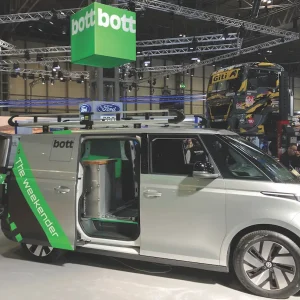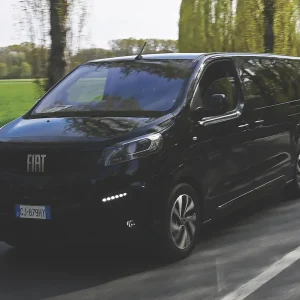Barring any late setbacks, the delayed 2021 CV Show will take place from 31 August to 2 September.
Mike Hawes, CEO of the Society of Motor Manufacturers and Traders, one of the show’s operators, expects to see an array of new technology at the NEC, reflecting the LCV industry’s rush to reduce its carbon footprint.
“The pace that needs to take place [to decarbonise the industry] is incredibly fast,” said Hawes.
With new LCV sales reaching record levels in the first half of the year, boosted by demand for home deliveries, Hawes acknowledged the strength of the market’s recovery.
“Vans picked up incredibly quickly after the shutdown,” he said.
Maxus
Maxus, which has consistently exhibited at the event in recent years as it rebranded from LDV and strove to gain a foothold in the UK market, will showcase an all-electric stand this year with pride of place going to its eDeliver 3 and eDeliver 9 vans.
Mark Barrett, general manager at Maxus Europe, said almost half of the brand’s 800 UK sales in the first half of the year were electric vans, and that this would grow to more than 50% in the coming months. He added that parcel delivery giant DPD has ordered 750 Maxus vans, consisting of a mix of eDeliver 3 and eDeliver 9 models.
Barrett revealed that Maxus is to introduce a chassis cab based on the eDeliver 9, which will be available in two lengths – L3 and L4.
He admitted that SAIC-owned Maxus has been hampered by the global shortage in semiconductor microchips as well as delays in shipments of its vans from China, but claimed 3,500 more would arrive in the UK by September.
“There was a two-month delay with the chip shortage and shipping has been a disaster,” he said, but added the manufacturer had now “caught up on production”.
Looking further ahead, Barrett said Maxus is “pushing hard” to secure an all-electric pick-up truck for the UK based on an existing model in China.
Maxus has recruited nine dealerships this year to take its UK total to 46 and plans to expand the network to 50 by the end of 2021.
LEVC
Although production started in November 2020, LEVC will give a long-awaited show debut to its VN5 van, an event that was delayed by the coronavirus pandemic.
Visitors will be able to peruse a standard version of the electrified van, which employs a petrol range extender, as well as conversions, including a temperature-controlled van adapted by fridge and freezer specialist Paneltex.
LEVC says the conversion is suitable for supermarkets, pharmaceutical companies and catering companies, which, thanks to the range extender, don’t have to worry about the chiller compartment eating into the van’s electric range.
“The chiller van [sector] is a key market to capitalise on,” said an LEVC spokesperson.
During National Butchers’ Week in March, LEVC loaned a VN5 chiller van to Clerkenwell-based butcher Turner & George to deliver online orders to customers in London.
LEVC admits Covid-19 has impacted its rollout of the VN5 but says it is
in the process of talking to potential fleet partners such as Royal Mail, BP Group and the West Midlands Ambulance service.
Ford
The UK’s market leader is to return to its prominent position in Hall 5 at the NEC. The centrepiece of the display will be a demonstration of the manufacturer’s FordLiive connectivity service, which is designed to reduce downtime for LCV operators.
FordLiive enables a ‘smart maintenance’ service, allowing servicing to be scheduled at the most efficient time, and providing notifications when an action is recommended to prevent a breakdown.
Maintenance information specific to each vehicle is generated by the system based on real-time data sent automatically from the FordPass Connect modem. Since mid-2019 this has been fitted as standard on Transit, Transit Custom, Transit Connect, Ranger and Fiesta Van models.
The information is supplied to fleet managers via the FordPass Pro and Ford Telematics services, and the brand says it now wants to “switch on the other parties” – namely its technical centre in Dunston and its network of Transit Centres – enabling technicians to access the past 60 days of each vehicle’s data to help with diagnosis and allow parts to be ordered before the vehicle gets to the workshop. Ford claims the service will trigger a 60% improvement in vehicle uptime.
Another major attraction on the blue oval stands will be the public unveiling of the E-Transit, which is set to come to market in the first half of next year following customer trials of the electric model, which began in June.
Other highlights will include a special edition of the performance Ranger Raptor pick-up and a tipper conversion of the Ranger pick-up, which will join the manufacturer’s One Stop Shop conversion programme.
Toyota Professional
Electric powertrains will take centre stage with the unveiling of the Proace City Electric likely to attract most interest before it goes on sale before the end of the year. Its big brother, the Proace Electric – which launched in May 2021 will also be on the stand.
With a facelifted version of the Hilux pick-up introduced in 2020, however – replete with a new 2.8-litre diesel engine – Gareth Matthews, Toyota Professional’s UK boss, said: “There’s still a real need for diesel.”
Given that the Hilux and Land Cruiser will also be exhibited, Matthews said the message would be to recommend “the right powertrain for the right customer at the right time”.
Toyota will also use the show to promote its new Relax warranty offer, which adds an extra year to the warranty with every service, up to a maximum of 10 years with mileage capped at 100,000 miles.
Geotab
Telematics provider Geotab will showcase its Go 9 platform designed to aid fleets transitioning to electric vans. The company, which says light commercials account for 65% of its vehicles, maintains that mixed fuel fleets are inevitable until 2030, when production of internal combustion-engined vehicles will be phased out. It will focus on driver education with an emphasis on how driving an electric van differs from driving a diesel or petrol vehicle.
Go 9 inputs data to analyse how fleets use their vans in order to determine which assignments would be suitable for LCVs, taking into account factors such as payloads and temperatures.
“The state of charge is important,” a Geotab spokesperson said. “A vehicle charging is a vehicle in downtime.”
The company will assess driving style, battery degradation and the way aerodynamics affects range – through carrying ladders, for example.
In order for fleets to effectively use electric vans, the spokesperson added: “Route optimisation is paramount.”
Locks 4 Vans
The van security expert is to move beyond its usual field of operation by exhibiting cargo bikes made for last mile urban deliveries, to illustrate how the company oversees the transport journey of goods from trucks to vans to their final destination.
Locks 4 Vans will also demonstrate how its products are evolving to protect van bodies made from lightweight materials like aluminium and plastic, which are commonly used on EVs to protect range and payload, the company says. It has developed security shielding, which consists of an inner skin of lightweight metal fitted behind the van’s doors.
Clayton Power
The off-grid power supply specialist will be making its standalone debut at the CV Show, having previously attended as a guest of BriStor. The company will showcase its LPS 2 lithium power supply pack with built-in batteries, which it claims is ideal for electric vans as it charges via a mains “hooker” or by solar power and does not require the vehicle’s engine to power equipment.
Clayton Power says many of its customers operate in the utilities sector, where the majority of vans are still powered by internal combustion engines but the presence of electric technology is increasing.
Bri-Stor Systems
The van racking company looks set to have one of the most intriguing stands at the NEC, with the main attraction set to be a mobile barbershop.
As a result of a partnership with mobile barber Trim-It, Bri-Stor agreed to supply 100 mobile barber shops to the business converted from Citroen Relay and Peugeot Boxer vans. Customers are able to book a haircut at their home or place of work via the Trim-It app.
The business received a boost when it was featured on the Channel 4 show ‘The Money Maker’ in May 2021, which Bri-Stor claimed led to an increase from 400 to 1,000 in the number of customers interested in ordering a mobile barber shop.
Features of the barber shops include mirrors fitted to the bulkhead, back lighting incorporating the Trim-it logo, seating for waiting customers and the integration of an on-board energy centre that can provide up to 10 hours of power with the engine turned off.
Bri-Stor will also have a dropside conversion on its stand and TV screens demonstrating welfare vans made for British Gas and Vauxhall Vivaro conversions for BT Openreach.





